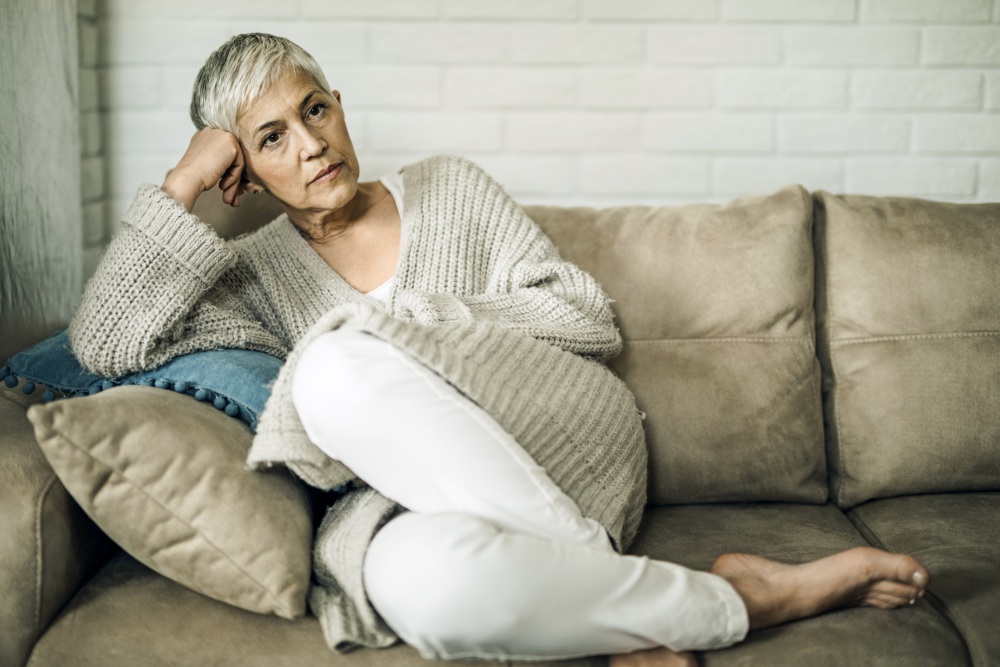How much do you really know about menopause? Most New Zealand women reach menopause – defined as 12 consecutive months since your last period – between 45 and 55 years of age, and the average is around 51. Before that, your body’s production of the hormones oestrogen and progesterone slows down, and your periods become irregular. These hormonal changes that are part of menopause (primarily the fall in oestrogen) cause physical and psychological effects that can last for five to 10 years.
“At the time when they experience menopause, women are often the meat in the sandwich,” explains endocrinologist Dr Sonia Davison. “They might have ageing parents with care needs, they might be working and at the peak of their career, and they may still have children living at home.
“So, women are often caring for everyone else and their care for themselves diminishes. But this is a time in their life when women should find some balance, and prioritise themselves and their health.”
Although some women “breeze through menopause”, other women are mentally and physically exhausted by this phase, according to specialist GP and “The Menopause Doctor” Dr Linda Dear.
“It can be such a stressful time for women. When you get into your forties, you think, ‘I’m not old yet. I’m a bit more sorted with my life, job and kids’… then your biology can come and sweep it all out from under you.”

In a survey of 4288 New Zealand women on their experience of menopause, while some woman did not experience any symptoms at all, 58 percent of respondents described their symptoms as “severe” or “very severe”.
“It catches women out,” says Linda, adding there needs to be more awareness about what can happen during what can be a major life change for women. “Even though it’s inevitable, we’re still not ready enough for it as females.
“Puberty gets some attention, pregnancy gets some attention, and then when women get to perimenopause, it gets a bit quiet – there isn’t as much support, education or noise. We have to celebrate menopause and make it more of a time that we aren’t afraid to talk about. It shouldn’t feel like a dirty secret.”
Taking care of yourself doesn’t have to be time-consuming and complicated. Here, the experts outline some lifestyle changes that can make all the difference to how women experience midlife and menopause.
Get informed
Get to know your biology and all the different symptoms you may experience during this change, urges Linda. The survey of New Zealand women showed 64 percent of respondents did not know their symptoms were due to menopause. “Menopause can be sneaky,” says Linda. “It’s so varied and women are all different.”
Perimenopause – the phase prior to menopause, can also begin up to 10 years before your last period, meaning many women are in their late thirties or forties when symptoms first appear. Hormones play crucial roles in regulating various bodily functions, and their reduced levels can lead to a wide range of physical and psychological symptoms, including vaginal changes, headaches, irritability and loss of confidence.
Many women never experience the “classic symptoms” of menopause such as hot flushes, and instead experience other symptoms that can be non-specific in nature, such as anxiety or insomnia. This can mean women – and health experts – can fail to recognise menopause as being the cause of the symptoms. “A lot of symptoms women get are emotional and psychological. If we prepare women that is what perimenopause might look like, women can spot what’s happening sooner,” Linda says. “Often what happens is women just struggle on for a long time, blaming their busy life or jobs – not to say all of that doesn’t matter – but hormones get forgotten.”
For a full report of New Zealand women’s symptoms, visit menodoctor.com/nzsurvey
Huff and puff

Get mentally and physically fit for this phase of your life, and prioritise a healthy lifestyle. “When our ovaries quit, our body and brain have to make an effort. We need to look after ourselves and that begins with basic lifestyle stuff – break up with alcohol, sugar, caffeine and late nights,” says Linda.
Regular exercise is important at any age, and the menopause years are no exception, adds exercise physiologist Esme Soan. Studies have shown that menopause symptoms, such as hot flushes, are less severe in women who do medium to high levels of physical activity.
“Exercise helps maintain bone density, reduces the risk of fractures, reduces cardiovascular risk, and helps women maintain a healthy weight and healthy pelvic floor,” says Esme.
A combination of aerobic exercise and resistance exercise, such as weights, is ideal. Each week, aim to do around 150 minutes of moderate-intensity exercise or 75 minutes of vigorous exercise. Add in two days of resistance training too.
Eat

Nourish yourself with a well-balanced diet that includes a variety of fruits, vegetables, whole grains, and high-quality protein and dairy products. Calcium and vitamin D (dairy products, green leafy vegetables, tofu, beans, and sardines) are great for maintaining strong bones and warding off osteoporosis. Omega-3 fatty acids (oily fish and walnuts) can reduce inflammation and improve your heart health. Phytoestrogens – plant compounds that mimic oestrogen (the hormone that declines during menopause) – may help balance hormones and reduce hot fluhes, night sweats and vaginal dryness. Foods that contain phytoestrogens include broccoli, cauliflower, dark berries, chickpeas and linseeds.
Consider MHT

Menopausal hormone therapy (also called hormone replacement therapy) can be highly effective in treating symptoms. A treatment that replaces the female hormones that decline during menopause, MHT can help relieve symptoms such as hot flushes and night sweats, as well as prevent osteoporosis and fractures. There are different types and forms available including tablets, patches and creams.
Your GP can help you choose the best option for you, based on your symptoms, preferences and medical history. “We don’t need to make women feel like they have to get medication and hormones to get through this – it’s not essential,” says Linda. “But it’s something we should offer women more regularly than we have been. For some women, it is literally life-saving and life-changing. It can be transformational.”
Manage your mood
Mood swings are another perfectly normal sign that your hormones are changing and it’s time to lose the stigma around them, says clinical neuropsychologist Dr Nicola Gates. “There’s no point in being hard on yourself for having mood swings.”
Accepting emotional changes as a natural part of this transition is a great way to begin to regain control. “Many things influence mood swings – your hormones, what’s going on around you and what’s going on inside your head, too,” says Nicola. “But there’s no excuse for behaving badly. We’re still responsible for how we interact with other people.” Rather than exploding, take a few slow, deep breaths while using mindfulness techniques. Remembering that your dramatic shifts in mood are only temporary can also help to put things into perspective.

It’s also worth looking at your lifestyle. “Not getting enough sleep can impact your mental health and having lots of hot flushes can negatively affect your mood, too.” Nicola suggests trying meditation and exercise for relaxation, while avoiding known triggers for hot flushes. “They can be brought on or amplified by alcohol, nicotine, caffeine, spicy food and too much sugar.”
If your mood swings often leave you feeling irritable or depressed, it’s worth addressing it with a loved one or your doctor. “The reduction of oestrogen affects other neurotransmitters such as endorphins, serotonin and oxytocin,” Nicola explains. This change in brain chemistry can in turn lead to depression and anxiety. If you’re struggling with stress or a persistent low mood, see your GP. “Don’t use the fact that you’re having mood swings as a reason to be self-critical – try self-compassion instead,” she advises.
Love the skin you’re in

Changing body shape can impact confidence and self-esteem. Alongside other possible symptom such as vaginal dryness and uncomfortble sex, libido can also bottom out during this time, which can affect a woman’s idea of how she feels about herself and her relationship. Experts say some women struggle with the loss of fertility and that sense of being younger, and research has found that women who experience more severe menopausal symptoms are more likely to fall out of love with their body image. If body image worries are having an impact on your daily life, talk about those concerns with a GP.
Consider all options

“It’s about options for women,” says Linda, emphasising care is not a one-size-fits-all approach. In addition to MHT and exercise, there are non-hormonal treatments, complementary therapies and more available. Sometimes, it’s a combination of treatments that brings relief. “Just because it’s natural, it doesn’t mean it’s not difficult. We need to present women with options and not judge women for whatever helps them – whether that is natural, medical or doing absolutely nothing,” she explains. “There are so many good things about this phase, where you are emerging into this other version of yourself. For a lot of women, ‘the change’ leads to other changes, which can be really positive, like a new job or career, or just being more comfortable in themselves.”



